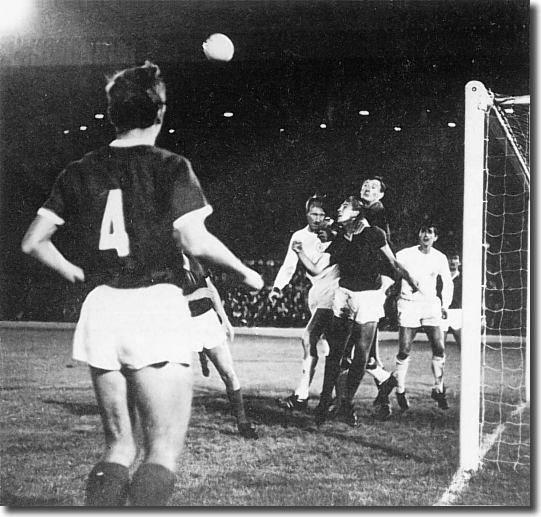 |
 |
 |
 |
 |
 |
 |
 |
 |
Inter Cities Fairs Cup Final 2nd leg - Elland Road - 35,604
Scorers: None
Leeds United: Sprake, Bell, Cooper, Bremner, Charlton, Hunter, Reaney, Belfitt, Greenhoff, Giles, O'Grady
Dinamo Zagreb: Škoric, Gracanin, Brncic, Belin, Ramljak, Blaakovic, Cercek, Piric, Zambata, Gucmirtl, Rora
The first leg, in Zagreb on 30 August, was
lost 2-0, leaving United with a steep hill to climb at Elland Road on
Wednesday, 6 September. It had been United's fourth game of the season, and they had
scored just once, through Jimmy
Greenhoff in the opening day draw with Sunderland. Leeds had
suffered three straight defeats, though they managed to beat Fulham
2-0 three days after losing in Zagreb with goals from Rod
Belfitt. The performance suggested that the Peacocks were
at long last running into form. As was the wont of a United board made up of sharp, self made businessmen,
they announced a hike in ticket prices for the home leg of the final.
Phil Brown covered the story in the Evening Post: 'While Leeds
United directors did only a logical thing in raising their prices … they
placed a big responsibility on their side for a good gate. For United
have been unfortunate, their finance chairman, Mr Albert Morris, thinks,
in having had to wait until now for the final to be played. Being played
so early in September, the Elland Road leg of the final comes just at
a time when a large number of Leeds and Yorkshire people are feeling the
financial effects of holidays, Mr Morris remarked, adding that he would
have been much happier if the final could have been played last May. However,
top class football is no respecter of clubs. 'I have been repeatedly asked about United's sharp increases of prices,
and have had a few letters on them from complaining supporters, but nothing
else could be expected but that United would lift prices for their European
final. Every final is played at higher prices - except the West Riding
Chairman Harry Reynolds: 'We trust the public will accept the normality
of us putting up our prices this time, and will realise that any profit
we make will go back into the club to help pay for not only its costly
running as a leading side but for the very large scale ground improvements
we have been and are undertaking.' For the record, these were the prices:
There was a crowd of 35,604 for the game, with the price hike boosting
gate receipts to Ł20,177. It was a new Elland Road record, beating the
previous best, Ł16,000, at the Sheffield United v Leicester City FA Cup
semi final of March 1961. The main speculation before the game was whether former England No 9,
Alan Peacock would be recalled to
the side for his heading ability. There was a notion that if the Slavs
were to be undone it would come through aerial domination. Peacock's last
game for Leeds had been as an emergency centre-half in the final league
game of 1966/67; his last game up front had been on 8 April in the FA
Cup quarter-final against Manchester City. Instead, Don Revie opted for the
two 21-year-olds, Greenhoff and Belfitt, operating in tandem. He did,
however, spring one surprise by drafting Paul Reaney in at right wing
to make up a midfield four with Bremner, Giles and O'Grady. It was a curious
selection, overtly negative and smacking of caution. The move may have
been prompted by the away goals counting double rule that had been introduced
for European competitions; United knew that a single Dinamo goal would
leave them needing four strikes themselves. Gary Sprake, Willie
Bell, Jack Charlton, Norman
Hunter and Terry Cooper formed a consistent and experienced United rearguard
to avert such a setback, and Reaney was enlisted for some midfield insurance. In later years, Mike O'Grady hinted
at the frustration felt by many of his colleagues at the extreme prudence
of the manager: 'Revie was really defensive although we had been beaten
away. He filled our heads with the opposition … He was really cautious,
despite the away result. For one thing, he had Paul Reaney on the right
wing but also he filled our heads with the opposition. I was a winger
yet he was warning me about the other winger ... expecting me to operate
defensively as well as up front. It was hard work. You'd be sitting there
thinking: "God, just let us play!"' Gary Sprake: 'We felt extremely confident going into the game but we
were better suited to defending a lead than overturning one. We still
sometimes lacked that creative guile and someone who could put the ball
away on a regular basis - Johnny Giles was our top goalscorer. We were
still too rigid in our tactics.' The Dinamo eleven was unchanged from the first leg. The Slavs were renowned
for their defensive resilience, though they represented less formidable
opposition on their travels, as noted by Revie: 'They were nowhere near
as good against Eintracht Frankfurt at Frankfurt in the semi-final when
I saw them lose 3-0 in the first leg even with their great centre-forward
Lamza, now injured, as they were last night. Now that we have played them
we know a lot more about them … Their crowd here last night was also very
valuable to them with their enthusiasm.' Billy Bremner was similarly upbeat: 'They are nothing marvellous. They
are good, but not so good that we can't beat them and win the Cup at Elland
Road. Our scoring blank has just got to end sometime, and the same attack
that we had last night even without Johnny Giles is quite capable on form
of getting the three goals.' Ivica Horvat, who was now managing Dinamo jointly with Branko Zebec,
said after the first leg: 'I am delighted my men are two up. It is very
comforting. But the final is not over and Leeds is, I hear, a difficult
place to win even narrowly or even draw. I would have been in sheer delight
if we had got three, but two is at least a foundation. However, we do
not regard the final as over by any manner of means. We have come here
to win not to defend. Obviously, the best form of defence is to attack,
and we shall attack. Besides, it would be difficult just to defend for
the whole match.' Despite United's defensive formation, they took the game to Dinamo early
doors and made some decent chances. In the opening minutes Jimmy Greenhoff
flicked on a left wing centre from Giles but his subtle header slipped
past the far post with goalkeeper Škoric rooted to his line. The miss
set the tone for the evening. The return of Giles, in only his second appearance of the season, made
a difference, bringing poise and incisiveness to the Leeds play. As Eric
Stanger observed in the Yorkshire Post, 'They were faster, quicker
to the ball and prepared to chase the flimsiest of chances.' Giles formed
his usual telepathic partnership with Billy Bremner and dominated affairs,
though United struggled to make headway. They never made the space out
wide that might have been crucial, playing most of their game through
the middle. Dinamo focused doggedly on retaining possession and slowing the tempo,
belying Horvat's promise of attacking football; their deliberate play
prohibited any serious Yorkshire impetus. Brncic, Belin and Ramljak proved
particularly adept at sustaining a suffocating defensive blanket and had
no need for wild clearances. For all that, the game was played in and around the Dinamo penalty area.
Stanger: 'One long range shot from Hunter whistled past the post. Greenhoff,
slightly off balance, shot over after a dazzling run by Bremner, and Škoric
once dived to clutch Giles' shot on the line with Belfitt and Greenhoff
rushing in for the kill.' The disappointing thing was not the number of United chances, for there
were many, but rather the lack of imagination and refinement. There was
a sad inclination to metronomically lump the ball high into the war zone
of the Zagreb penalty area, and the tall Dinamo defenders made easy meat
of such tactics. Had Peacock been present, the tactic might have been
reasonable, but Belfitt and Greenhoff were never dominant in the air and
Jack Charlton could not be wholly devoted to attack. When the Dinamo back
four was breached, goalkeeper Škoric, 'an athletic, prehensile goalkeeper,
as lithe as a black puma' (Geoffrey Green in The Times), was there
to clutch the ball safely. At times, Leeds did try a more thoughtful approach, but often fell into
the trap of over elaborating, running onto the rocks of smart covering. Green reflected sadly on United's efforts: 'Charlton spent more time
in the Zagreb goal area than he did in his own, as he tried to connect
with a stream of corners and free kicks. Once he had a goal disallowed
in the second half amid a ruck of players, and twice the full-backs, in
turn, stopped a header by Charlton and a shot by Bremner on the line.
Škoric was momentarily missing from his trapeze. 'Leeds were thoughtless and unsubtle … They were like automatons crushing
themselves against an iron defensive fortress, with no effective methods
to break down the citadel. Sprake, at the other end, was virtually an
addition to the national unemployment figure, except once when, in a quick
break out of defence, Piric left his bar twanging like a guitar string
with the first shot of the night. 'The Slavs gladly surrendered midfield and settled to argue things in
one half of the pitch, and that mostly their own penalty area. Thus, wave
after wave of white shirts beat like breakers against an impregnable rock.
Giles, Bremner, Hunter, even Charlton, ran their hearts out. But heart
is not enough in football. There must be a cool, cunning brain somewhere,
and not even little Giles, the schemer, could provide that against these
ruthless, uncompromising Slavs.' In the closing minutes of the first half, Bremner looked to be getting
somewhere with a neat dribble from the halfway line before unyielding
defenders unfairly blocked his path. With depressing predictability, the
free kick came to nothing, and it was evident that United were running
short on ideas. They were also lacking any fortune, as Eric Todd observed in The Guardian.
'It became increasingly obvious that Leeds would need luck as an ally,
and the first few minutes of the second half suggested no less obviously
that they were not going to get it. Belfitt, as he fell, unbelievably
made contact with the ball when Bremner centred but it went over the crossbar.
Then, after a corner, Leeds forced the ball past Škoric and were refused
a goal, presumably because the goalkeeper had been impeded. After another
corner Gracanin cleared off the line from Charlton.' Try as they might, United could not make the vital incision and the blue Dinamo rocked on a couple of occasions when their area was packed with
players and the physical power of Leeds men threatened to sweep them aside,
but, through a combination of woodwork, rushed United play, cool defending
and luck, they held out. Eric Stanger in the Yorkshire Post: 'Dinamo, on the two ties,
were worthy winners of the Cup … In Zagreb they were the better side in
attack, last night Leeds could not break down their tough, hard tackling
and wonderfully positioned defence. For all their efforts, Leeds had just
not the class in attack to seize the half chances which were all this
solid phalanx of blue permitted them. A Greaves, a Ball, a Hurst or a
Ron Davies might have done the trick but unhappily for all their willingness,
Leeds had not a marksman in that class. 'If anything, Leeds had too much of the game. Had Zagreb been drawn upfield
more there might have been greater room for the counter raid. As it was,
the constant weight of the Leeds pressure merely served to draw the Zagreb
net tighter. It was always tough, relentless football. Zagreb did not
stand on ceremony and conceded 23 kicks for fouls against nine by Leeds,
but only once did real trouble threaten. That was 15 minutes from the
end when Gucmirtl and Giles clashed.' The Evening Post featured an anachronistic post-match review,
which merits recording for posterity if only for its encapsulation of
the Elland Road atmosphere: 'It was an odd sort of a Cup final really. The most sensational of the
preliminaries was a loudspeaker announcement that Kenneth Crispin had
come without money and would David Lister, already in the ground, please
go to his aid. They appealed to David again at half time. Unhappy Kenneth! 'We were at the Gelderd Road end, Elland Road's Kop of concrete terracing.
It was possible to stand easy. There was no surging, no swaying. I kept
my number nines firmly on the same piece of concrete right through the
match. Two men behind drank coffee out of plastic cups without spilling
a drop. '"Thirty-five thou," said a 50-year supporter. He was only
604 out. 'There are things to learn about an Elland Road crowd. It's divided firmly
into US and THEM. WE on the Kop were on the side of the angels. THEY were
the fans packed into the echoing, corrugated iron-covered Scratching Shed
at the opposite end of the ground. "The only way to deal with THEM,"
said a young man somebody called Cliff Michelmore, "is to make seats
for all and charge 100 guineas a season." '"You want to get in with THEM" a young man was told after
delivering a lurid oath. 'But the US and the THEM became a communal WE during the game. 'In fact, the angels take their lead from the Scratching Shed. From
the opposite end of the ground, this now notorious enclosure resembles
an assembly of puppets. They act as one, raising their scarves in parallel
lines, and they speak as one. There's nothing ragged about a Scratching
Shed chant heard across the ground. It comes over as a kind of choral
shouting. United's retired chairman came in for a salutary volley. 'Harry
Reynolds! Harry Reynolds!' But in the main it was the plainsong of 'United!
United!' and sadly plaintive it became as the match went on and the goals
didn't come. We picked up their chants but our efforts were sadly ragged
in comparison. 'There wasn't much that we could do with the names of the Zagreb team.
The goalkeeper, Škoric, who came out of the dressing room pirouetting
and kicking his heels above his head was viewed with admiration which
turned to awe as the game went on. "Champion the wonder horse!"
we shouted when he fielded the ball. I wonder what Škoric made of that. 'The tension and excitement of the first half ebbed like tepid bathwater
after half time. It was United's disallowed goal - accepted on the terraces
as a near inevitable blow of fate - that really pulled the plug out. After
that you could hear fragments of conversation… '"A bob for bus fares, 7s 6d to get in, 2s 6d for this Leeds United
book that tells you that Ronnie Hilton will be waiting for the result,
a bob for '"… so I said to Joe, come on, it's the final. But he said, no,
he'd see it on t'telly…" 'The result must have been a cruel disappointment to the fans. But in
an odd sort of way they, the fans, won. They took Zagreb's medicine with
good humour and not acrimony. '"Krauts!" one youngster had been shouting in the mistaken
idea that Zagreb is in Germany. "Krauts!" he still called at
the end, but added almost sotto voce, "Good footballers, though!" 'They viewed the ineffective yet wholehearted efforts of the young men
in white with tolerance and even affection. '"Send for t'seventh cavalry," shouted one man. Another capped
that with "Send for Donald Peers." 'And at the end, originating in the stand, came the low crackle of applause
for Zagreb which suddenly swelled to a thunderous tribute from all quarters
of the ground. Leeds United's fans, once again winning nowt, did not grudge
the Yugoslavians their summat.' After the final whistle, United director Albert Morris wished his visitors
well and applauded sportingly as FIFA president Sir Stanley Rous presented
them with the trophy. West Yorkshire could only look on enviously as its
team missed out on the silverware once more and wish that one day it might
be their turn to sample some glory … 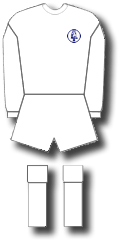
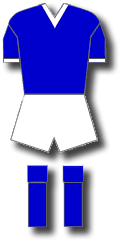 The 1967/68 season was scarcely under way before Leeds United were
pitched into high profile battle for silverware. In the spring they had
battled through to the Inter Cities Fairs Cup final, but fixture congestion
had meant that the two-legged final against Yugoslavia's Dinamo Zagreb
was deferred.
The 1967/68 season was scarcely under way before Leeds United were
pitched into high profile battle for silverware. In the spring they had
battled through to the Inter Cities Fairs Cup final, but fixture congestion
had meant that the two-legged final against Yugoslavia's Dinamo Zagreb
was deferred.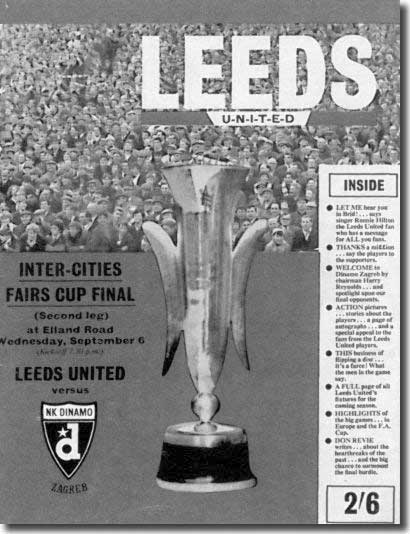 Senior
Cup, bless it. One increased Elland Road price jarred me - the 10s for
the paddock. Ten shillings to stand seems a bit grim even these days.'
Senior
Cup, bless it. One increased Elland Road price jarred me - the 10s for
the paddock. Ten shillings to stand seems a bit grim even these days.'
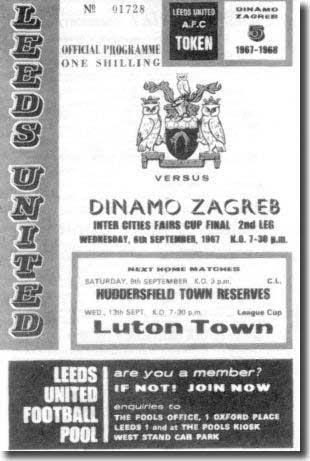 With
Cercek, Zambata and Gucmirtl constantly suggesting a Zagreb counter attack,
Leeds could never wholly abandon their defensive obligations.
With
Cercek, Zambata and Gucmirtl constantly suggesting a Zagreb counter attack,
Leeds could never wholly abandon their defensive obligations.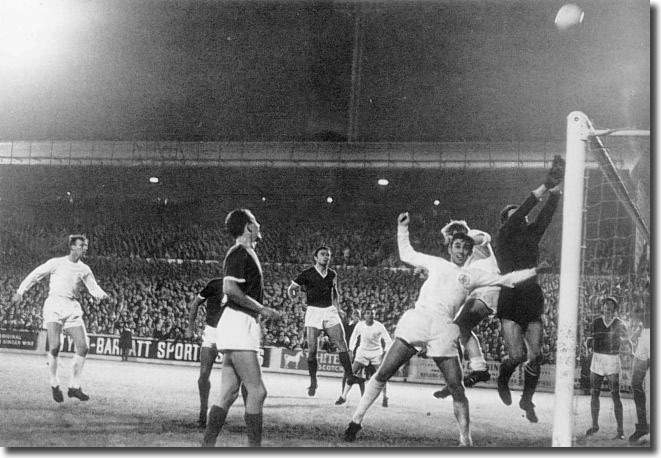 Yugoslavian wall simply shuffled across the pitch as circumstances dictated,
always too knowing, too assured, simply too refined to break under the
incessant waves of naďve and one dimensional attacking. There was not
a single goal to show for all the effort. Leeds had gone close many times,
but always there had been the niggling doubt that it was not to be their
night, and the Slavs were impressive in securing the goalless draw that
had been their mission from the start. Apart from Charlton's disallowed
effort, the nearest United came was in the second half when Brncic headed
a corner onto the top of his own bar.
Yugoslavian wall simply shuffled across the pitch as circumstances dictated,
always too knowing, too assured, simply too refined to break under the
incessant waves of naďve and one dimensional attacking. There was not
a single goal to show for all the effort. Leeds had gone close many times,
but always there had been the niggling doubt that it was not to be their
night, and the Slavs were impressive in securing the goalless draw that
had been their mission from the start. Apart from Charlton's disallowed
effort, the nearest United came was in the second half when Brncic headed
a corner onto the top of his own bar.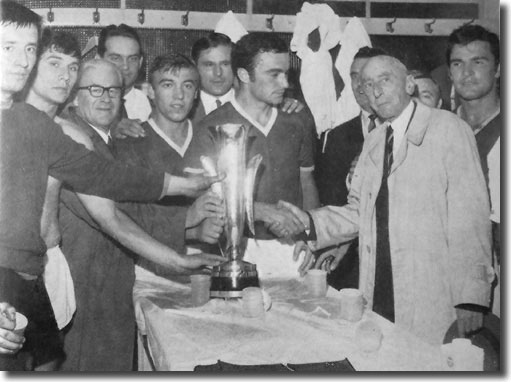 a programme - twelve bob before I've drowned me sorrows!"
a programme - twelve bob before I've drowned me sorrows!"
